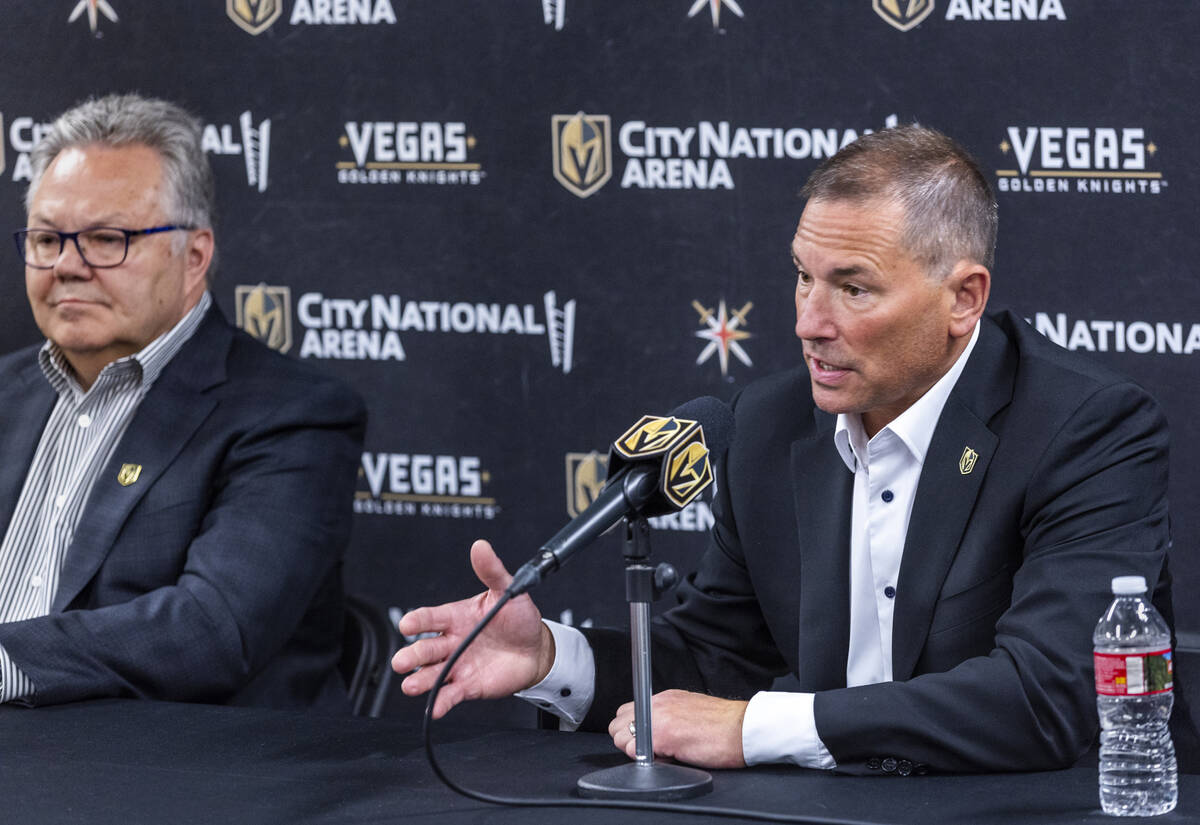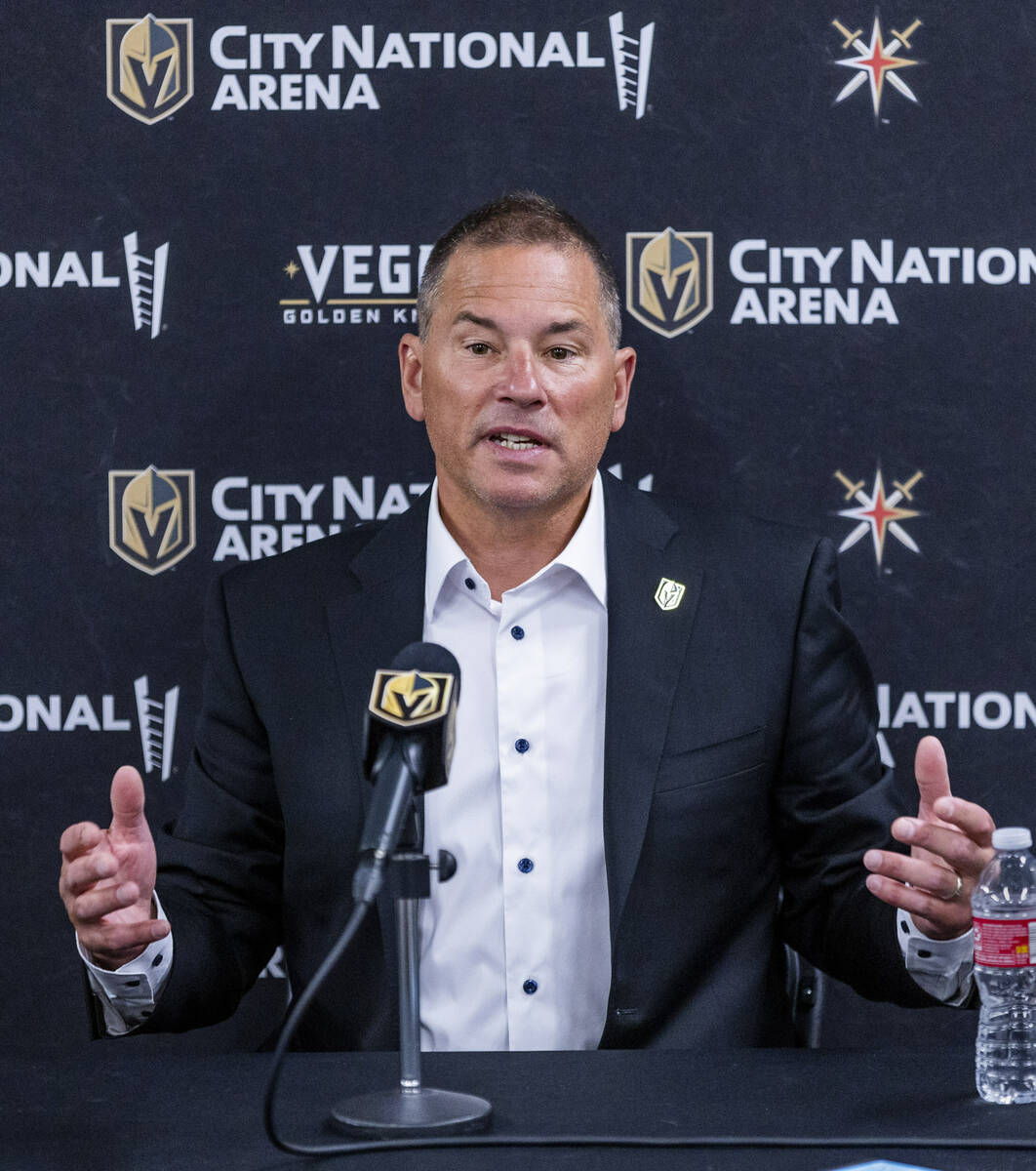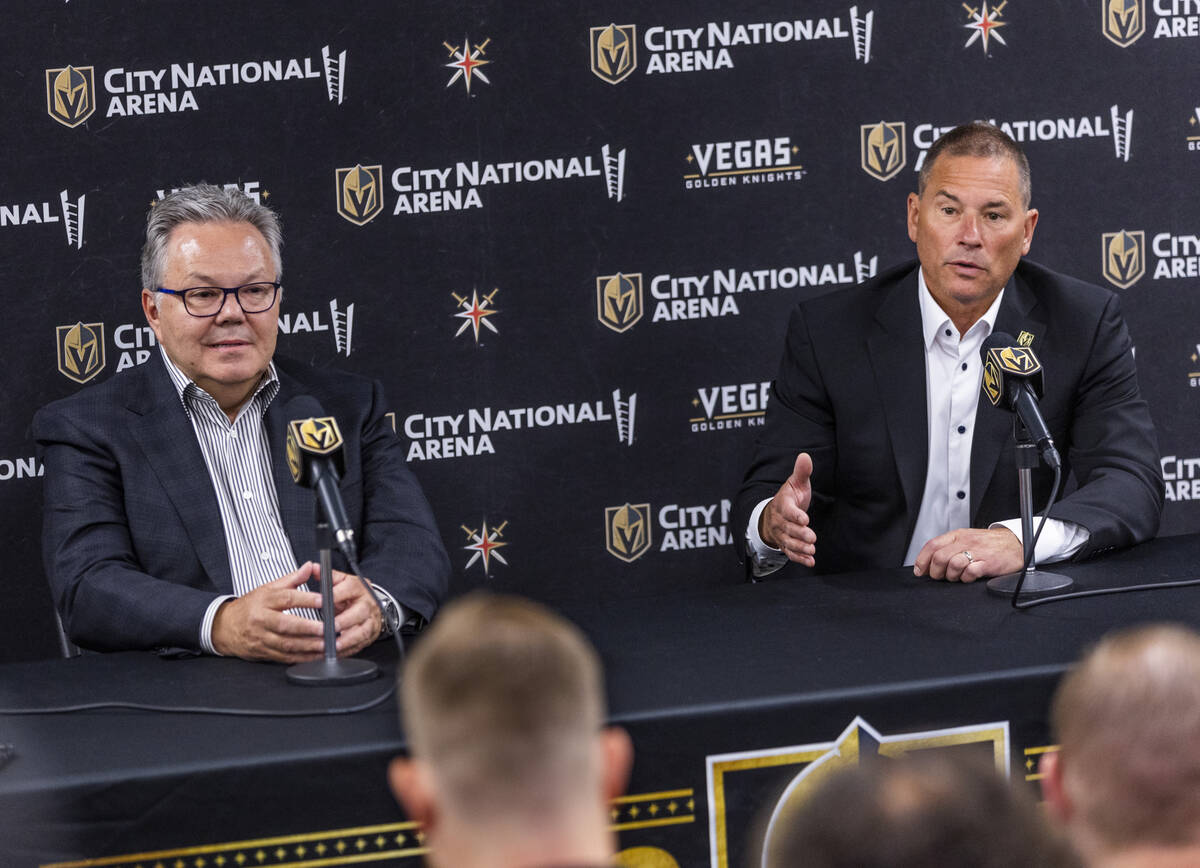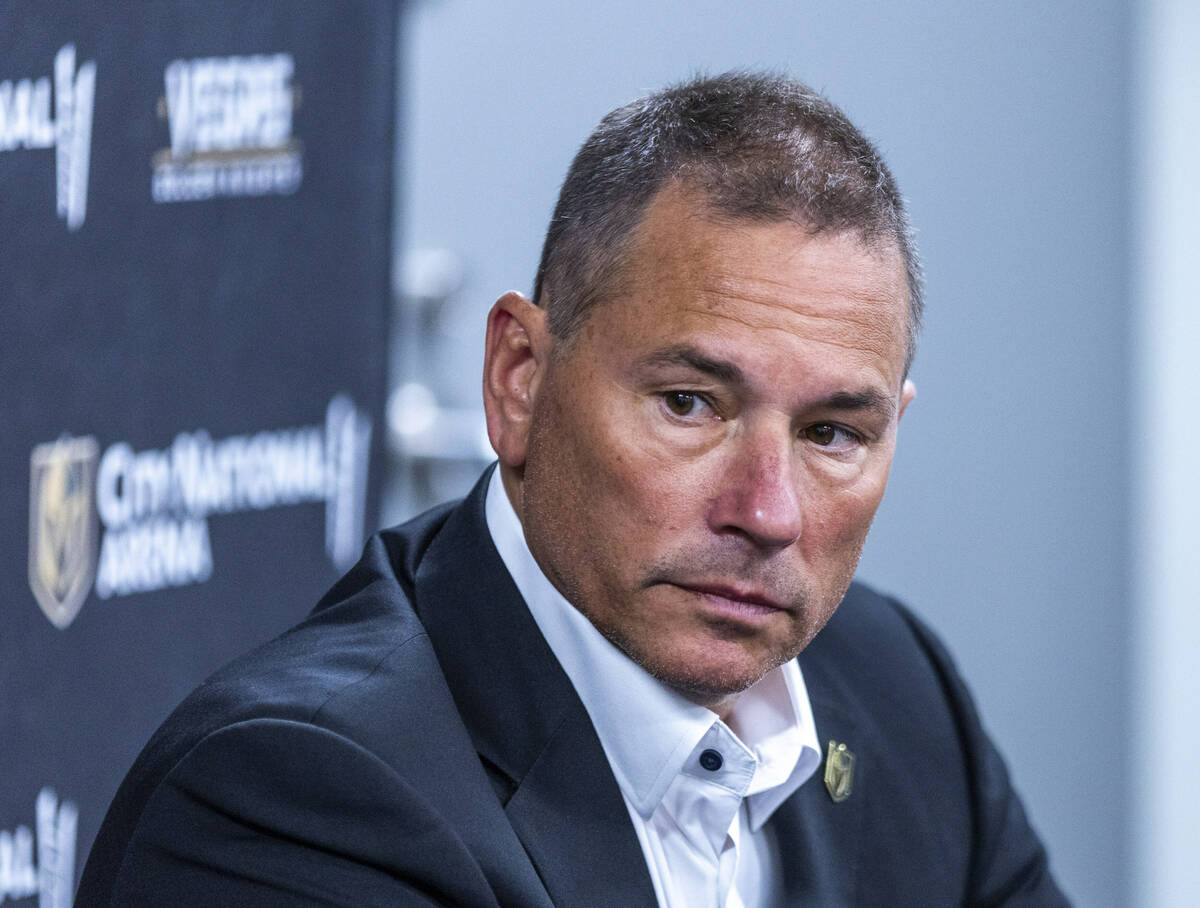Bruce Cassidy’s unique coaching journey led him to Knights
The man tasked with leading the Golden Knights back to the Stanley Cup Final began the long odyssey of his coaching career with a team called the Jacksonville Lizard Kings.
As far as Bruce Cassidy was concerned, it beat going back to school when his playing career was finished.
Coaching a now defunct team in a since demolished Jacksonville Veterans Memorial Coliseum was not the first unconventional road Cassidy would take. The 57-year-old compiled an outstanding resume the past six seasons with the Boston Bruins, but was not an overnight success.
Cassidy, hired Tuesday by the Knights to replace Pete DeBoer, took the long way twice to an NHL bench. It’s what makes the Knights hopeful his third time leading a team will be the charm, after Cassidy over time built himself into one of the game’s most successful coaches.
“Bruce’s path was intriguing for us,” general manager Kelly McCrimmon said. “A lot of people wouldn’t have been able to persevere and find their way through that.”
Transition to the bench
Cassidy showed plenty of promise as a player.
The Chicago Blackhawks drafted him in the first round of the 1983 NHL draft because he had fantastic vision and excellent passing skills for a defenseman.
“One of the best passers that I’ve ever played with,” said Darren Pang, one of Cassidy’s former Chicago teammates and now a Bally Sports Midwest and Turner Sports analyst. “His ability to dissect the defending team and lay a puck right on the tape was his strength.”
The only issues were his knees. Cassidy tore his left anterior cruciate ligament after being drafted, then tore the right one at age 29. He had 17 points in 36 NHL games, but the majority of his career was spent in the minor leagues or Europe.
Cassidy was the captain of the International Hockey League’s Indianapolis Ice when he injured his right ACL. He asked coach Duane Sutter if he could go behind the bench. Sutter said yes, and a seed was planted.
“I realized, this is pretty cool,” Cassidy said. “If you can’t play, you’re right in the action with the players.”
That experience led him to pick Jacksonville over school when he was done playing. He spent 1½ seasons there, a year in the IHL and another with the ECHL’s Trenton Titans before his first American Hockey League opportunity.
Along the way, Pang tried to tempt his former teammate into following him into broadcasting. But Cassidy didn’t bite.
“His love was for the heat of the battle,” Pang said. “Good for Brucey that he never took me up on that.”
In the NHL
Cassidy spent two seasons with the AHL’s Grand Rapids Griffins — winning two division titles — before getting his first opportunity at hockey’s highest level.
Washington Capitals general manager George McPhee, now the Knights’ president of hockey operations, needed a coach for the 2002-03 season. His pro scouts mentioned Cassidy as an up-and-coming candidate and recommended McPhee talk to him. Cassidy got the interview, and the job.
“There were similarities to (Vancouver coach) Bruce Boudreau where they really had to work their way up and did,” said McPhee, who gave Boudreau his first NHL opportunity in 2007. “(Cassidy is) a terrific guy. Very direct, very honest and very sharp.”
The first season was a success. The Capitals made the playoffs after missing out the previous season, losing in the first round to the Tampa Bay Lightning.
The second was not. Washington started 8-18-1-1, and Cassidy was fired. The Capitals began a rebuild and got their cornerstone in the 2004 NHL draft by taking Alexander Ovechkin with the No. 1 pick.
“We had some difficult personalities,” McPhee said. “I don’t know that (all-time wins leader) Scotty Bowman could have coached that team. We didn’t want to fire (Cassidy). We should have fired the team. And, in fact, about a year later we did. We just cleaned house.”
Cassidy looks back on his Washington tenure as a learning experience. He didn’t believe he was confident enough as a young coach to command a veteran locker room like he needed to.
That no longer is an issue.
“I told George, ‘I’m gonna get it right this time,’” Cassidy said.
Shipping to Boston
Cassidy wasn’t sure he would get another NHL opportunity after Washington.
He spent a year in Chicago as an assistant, then parts of two seasons coaching the Ontario Hockey League’s Kingston Frontenacs before being fired.
His next job, in 2008, was as an assistant with the AHL’s Providence Bruins thanks in part to a connection with then-Boston general manager Peter Chiarelli, a fellow Ottawa, Ontario-area native.
Cassidy was named Providence’s coach after three years and helped send future Bruins David Pastrnak and Torey Krug to the NHL. Five seasons later, he was promoted to the big club as Stanley Cup-winning coach Claude Julien’s assistant.
Bruins general manager Don Sweeney fired Julien on Feb. 7, 2017, and Cassidy got the interim job. He was ready.
“I was a lot more comfortable in my own skin,” he said.
The results speak for themselves. Cassidy coached the Bruins for parts of six seasons. They made the postseason every season, won six playoff series, captured a Presidents’ Trophy and reached the 2019 Stanley Cup Final. The teams were elite defensively, great on special teams and strong enough on offense to rack up the second-most wins in the NHL during his tenure.
But that didn’t prevent Cassidy from being fired June 6 after a first-round loss to the Carolina Hurricanes. Sweeney said he thought Cassidy’s direct and demanding style was no longer effective with the Bruins.
“That doesn’t mean it’s going to be less effective somewhere else,” Sweeney said then. “I do believe he’s a good coach, and he’s going to have a similar winning percentage elsewhere.”
Finishing the job
Cassidy’s wait for his third NHL coaching gig was a lot shorter than the one for his second.
He said there was “immediate” interest after he was fired. He wanted to get right back to work. It took all of eight days for him to join the Knights as their third coach in franchise history.
He arrives confident in his abilities. He will hold players accountable because, he said, “if you don’t have accountability, I don’t think you have much.”
That goes for young players, too. Bruins president Cam Neely said after the season he thought some of Boston’s young players were afraid to make mistakes. Cassidy knows from his own experience that even first-round picks can get passed over fast, so he doesn’t believe in wasting time and letting bad habits fester.
Whether that approach reaches the Knights and pushes them to success remains to be seen. The team is full of veterans who have either won it all or come tantalizingly close. Cassidy is in the same boat after being one Game 7 loss from a championship in 2019.
The Knights think the two sides will mesh to accomplish their ultimate goal.
“I think when you come close to winning the Cup, it’s always in the back of your mind and you want to finish the job,” Cassidy said. “I definitely have that mindset.”
Contact Ben Gotz at bgotz@reviewjournal.com. Follow @BenSGotz on Twitter.
Bruce Cassidy's coaching record
(W-L-T-OTL)
Washington
2002-03: 39-29-8-6
2003-04: 8-18-1-1
Total: 47-47-9-7
Boston
2016-17: 18-8-1 (2-4 playoffs)
2017-18: 50-20-12 (5-7 playoffs)
2018-19: 49-24-9 (15-9 playoffs)
2019-20: 44-14-12 (5-8 playoffs)
2020-21: 33-16-7 (6-5 playoffs)
2021-22: 51-26-5 (3-4 playoffs)
Total: 245-108-46 (36-37 playoffs)


























